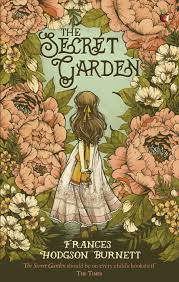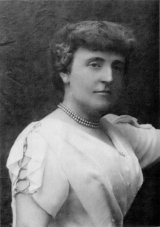The Secret Garden Page #18
The Secret Garden is a novel by Frances Hodgson Burnett first published in book form in 1911, after serialization in The American Magazine. Set in England, it is one of Burnett's most popular novels and seen as a classic of English children's literature. Several stage and film adaptations have been made.
“This is such a big lonely place,” she said slowly, as if she were turning matters over in her mind. “The house is lonely, and the park is lonely, and the gardens are lonely. So many places seem shut up. I never did many things in India, but there were more people to look at—natives and soldiers marching by—and sometimes bands playing, and my Ayah told me stories. There is no one to talk to here except you and Ben Weatherstaff. And you have to do your work and Ben Weatherstaff won’t speak to me often. I thought if I had a little spade I could dig somewhere as he does, and I might make a little garden if he would give me some seeds.” Martha’s face quite lighted up. “There now!” she exclaimed, “if that wasn’t one of th’ things mother said. She says, ‘There’s such a lot o’ room in that big place, why don’t they give her a bit for herself, even if she doesn’t plant nothin’ but parsley an’ radishes? She’d dig an’ rake away an’ be right down happy over it.’ Them was the very words she said.” “Were they?” said Mary. “How many things she knows, doesn’t she?” “Eh!” said Martha. “It’s like she says: ‘A woman as brings up twelve children learns something besides her A B C. Children’s as good as ’rithmetic to set you findin’ out things.’” “How much would a spade cost—a little one?” Mary asked. “Well,” was Martha’s reflective answer, “at Thwaite village there’s a shop or so an’ I saw little garden sets with a spade an’ a rake an’ a fork all tied together for two shillings. An’ they was stout enough to work with, too.” “I’ve got more than that in my purse,” said Mary. “Mrs. Morrison gave me five shillings and Mrs. Medlock gave me some money from Mr. Craven.” “Did he remember thee that much?” exclaimed Martha. “Mrs. Medlock said I was to have a shilling a week to spend. She gives me one every Saturday. I didn’t know what to spend it on.” “My word! that’s riches,” said Martha. “Tha’ can buy anything in th’ world tha’ wants. Th’ rent of our cottage is only one an’ threepence an’ it’s like pullin’ eye-teeth to get it. Now I’ve just thought of somethin’,” putting her hands on her hips. “What?” said Mary eagerly. “In the shop at Thwaite they sell packages o’ flower-seeds for a penny each, and our Dickon he knows which is th’ prettiest ones an’ how to make ’em grow. He walks over to Thwaite many a day just for th’ fun of it. Does tha’ know how to print letters?” suddenly. “I know how to write,” Mary answered. Martha shook her head. “Our Dickon can only read printin’. If tha’ could print we could write a letter to him an’ ask him to go an’ buy th’ garden tools an’ th’ seeds at th’ same time.” “Oh! you’re a good girl!” Mary cried. “You are, really! I didn’t know you were so nice. I know I can print letters if I try. Let’s ask Mrs. Medlock for a pen and ink and some paper.” “I’ve got some of my own,” said Martha. “I bought ’em so I could print a bit of a letter to mother of a Sunday. I’ll go and get it.” She ran out of the room, and Mary stood by the fire and twisted her thin little hands together with sheer pleasure. “If I have a spade,” she whispered, “I can make the earth nice and soft and dig up weeds. If I have seeds and can make flowers grow the garden won’t be dead at all—it will come alive.” She did not go out again that afternoon because when Martha returned with her pen and ink and paper she was obliged to clear the table and carry the plates and dishes downstairs and when she got into the kitchen Mrs. Medlock was there and told her to do something, so Mary waited for what seemed to her a long time before she came back. Then it was a serious piece of work to write to Dickon. Mary had been taught very little because her governesses had disliked her too much to stay with her. She could not spell particularly well but she found that she could print letters when she tried. This was the letter Martha dictated to her: “My Dear Dickon: This comes hoping to find you well as it leaves me at present. Miss Mary has plenty of money and will you go to Thwaite and buy her some flower seeds and a set of garden tools to make a flower-bed. Pick the prettiest ones and easy to grow because she has never done it before and lived in India which is different. Give my love to mother and everyone of you. Miss Mary is going to tell me a lot more so that on my next day out you can hear about elephants and camels and gentlemen going hunting lions and tigers. “Your loving sister, “Martha Phœbe Sowerby.” “We’ll put the money in th’ envelope an’ I’ll get th’ butcher boy to take it in his cart. He’s a great friend o’ Dickon’s,” said Martha. “How shall I get the things when Dickon buys them?” “He’ll bring ’em to you himself. He’ll like to walk over this way.” “Oh!” exclaimed Mary, “then I shall see him! I never thought I should see Dickon.” “Does tha’ want to see him?” asked Martha suddenly, for Mary had looked so pleased. “Yes, I do. I never saw a boy foxes and crows loved. I want to see him very much.” Martha gave a little start, as if she remembered something. “Now to think,” she broke out, “to think o’ me forgettin’ that there; an’ I thought I was goin’ to tell you first thing this mornin’. I asked mother—and she said she’d ask Mrs. Medlock her own self.” “Do you mean—” Mary began. “What I said Tuesday. Ask her if you might be driven over to our cottage some day and have a bit o’ mother’s hot oat cake, an’ butter, an’ a glass o’ milk.” It seemed as if all the interesting things were happening in one day. To think of going over the moor in the daylight and when the sky was blue! To think of going into the cottage which held twelve children! “Does she think Mrs. Medlock would let me go?” she asked, quite anxiously. “Aye, she thinks she would. She knows what a tidy woman mother is and how clean she keeps the cottage.” “If I went I should see your mother as well as Dickon,” said Mary, thinking it over and liking the idea very much. “She doesn’t seem to be like the mothers in India.” Her work in the garden and the excitement of the afternoon ended by making her feel quiet and thoughtful. Martha stayed with her until tea-time, but they sat in comfortable quiet and talked very little. But just before Martha went downstairs for the tea-tray, Mary asked a question. “Martha,” she said, “has the scullery-maid had the toothache again today?” Martha certainly started slightly. “What makes thee ask that?” she said. “Because when I waited so long for you to come back I opened the door and walked down the corridor to see if you were coming. And I heard that far-off crying again, just as we heard it the other night. There isn’t a wind today, so you see it couldn’t have been the wind.” “Eh!” said Martha restlessly. “Tha’ mustn’t go walkin’ about in corridors an’ listenin’. Mr. Craven would be that there angry there’s no knowin’ what he’d do.” “I wasn’t listening,” said Mary. “I was just waiting for you—and I heard it. That’s three times.”
Translation
Translate and read this book in other languages:
Select another language:
- - Select -
- 简体中文 (Chinese - Simplified)
- 繁體中文 (Chinese - Traditional)
- Español (Spanish)
- Esperanto (Esperanto)
- 日本語 (Japanese)
- Português (Portuguese)
- Deutsch (German)
- العربية (Arabic)
- Français (French)
- Русский (Russian)
- ಕನ್ನಡ (Kannada)
- 한국어 (Korean)
- עברית (Hebrew)
- Gaeilge (Irish)
- Українська (Ukrainian)
- اردو (Urdu)
- Magyar (Hungarian)
- मानक हिन्दी (Hindi)
- Indonesia (Indonesian)
- Italiano (Italian)
- தமிழ் (Tamil)
- Türkçe (Turkish)
- తెలుగు (Telugu)
- ภาษาไทย (Thai)
- Tiếng Việt (Vietnamese)
- Čeština (Czech)
- Polski (Polish)
- Bahasa Indonesia (Indonesian)
- Românește (Romanian)
- Nederlands (Dutch)
- Ελληνικά (Greek)
- Latinum (Latin)
- Svenska (Swedish)
- Dansk (Danish)
- Suomi (Finnish)
- فارسی (Persian)
- ייִדיש (Yiddish)
- հայերեն (Armenian)
- Norsk (Norwegian)
- English (English)
Citation
Use the citation below to add this book to your bibliography:
Style:MLAChicagoAPA
"The Secret Garden Books." Literature.com. STANDS4 LLC, 2024. Web. 25 Nov. 2024. <https://www.literature.com/book/the_secret_garden_427>.




Discuss this The Secret Garden book with the community:
Report Comment
We're doing our best to make sure our content is useful, accurate and safe.
If by any chance you spot an inappropriate comment while navigating through our website please use this form to let us know, and we'll take care of it shortly.
Attachment
You need to be logged in to favorite.
Log In